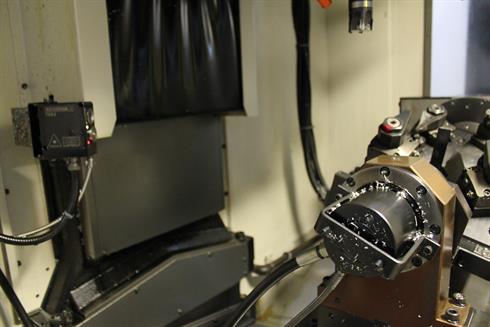Ta strona nie jest obecnie dostępna w Twoim języku. Możesz zapoznać się z tłumaczeniem automatycznym, korzystając z usługi Google Translate. Nie jesteśmy odpowiedzialni za świadczenie tej usługi, ani też wyniki tłumaczenia nie były przez nas sprawdzane.
Jeżeli chciałbyś uzyskać więcej pomocy skontaktuj się z nami.
Munjal Castings increases OEE by 50%, after using Renishaw TRS2 – tool breakage detection and tool setting probe
For any manufacturing company to be a market leader and become more competitive, it is vital to reduce costs, maintain quality, and provide timely delivery. Munjal Castings, based in Ludhiana, India, adopted this philosophy for its growth.
Background
Munjal Castings, established in 1980, is part of The Hero Group, and caters primarily to Hero Majestic in the automotive industry. The company currently employs 1,200 people at two plants, where it manufactures quality aluminium die cast components using 20 machine tools. Munjal Castings has emerged as one of the trusted names in the aluminium and zinc die casting industry, supplying 600 tonnes of castings each month, with a turnover of 1.5 billion INR. The company supplies components to Hero MotorCorp Ltd, Suzuki Group, Hyundai, Hero Cycles, Nissan, Tata, GM, and Daimler Chrysler, as well as supplying the export market. Aware of the vast business potential in the international automotive industry, the company has commissioned a third plant which is ISO TS 16949:2000 certified and has a capacity of 100 machines.
Challenge
A major challenge to overcome was frequent tool breakage, which caused delays in production and led to high levels of scrap and financial loss in terms of materials and time. The reputation of the company was at stake, as even a single substandard component could negatively affect goodwill towards Munjal Castings in the market.
Maintaining quality, cost and delivery within stringent deadlines is our company's unique selling point, which has helped us to stand apart from others. Daily, we supply 200,000 castings with 150 different component types to the automobile industry. Renishaw's products are reliable and are of high quality. With faith in Renishaw's technology, the management is confident of achieving greater results and reaching its targets.
Munjal Castings (India)
Solution
Renishaw TRS2 systems were installed at Munjal Castings to address this challenge. The TRS2 is an award-winning non contact broken tool detection system for machining centres. It determines whether a tool is present by analysing reflective light patterns and ignores any that are created by coolant and swarf, thereby eliminating false indications of a broken tool.Mr. P. L. Arora (Senior Vice-President of Munjal Castings) said: “The company was incurring huge financial losses due to high rejections. This prompted the management to pursue increased automated solutions and they purchased TRS2 from Renishaw. After installing 16 TRS2 systems, huge savings in costs and time have become a reality.”
The company's vision is to increase exports from 400 million INR to 1,000 million INR in the next three years. To achieve this, it has decided to increase automation with the help of process control solutions. According to Munjal Castings, machines with TRS2 installed have had their overall equipment effectiveness (OEE) increased from 50% to 76%. The target is to increase the OEE to 85%. Previously, 250 finished components were produced daily on each machine. Following installation of the TRS2 systems, production increased to 270 components per day.
Mr. Arora concluded: “Maintaining quality, cost and delivery within stringent deadlines is our company's unique selling point, which has helped us to stand apart from others. Daily, we supply 200,000 castings with 150 different component types to the automobile industry. Renishaw's products are reliable and are of high quality. With faith in Renishaw's technology, the management is confident of achieving greater results and reaching its targets.”
